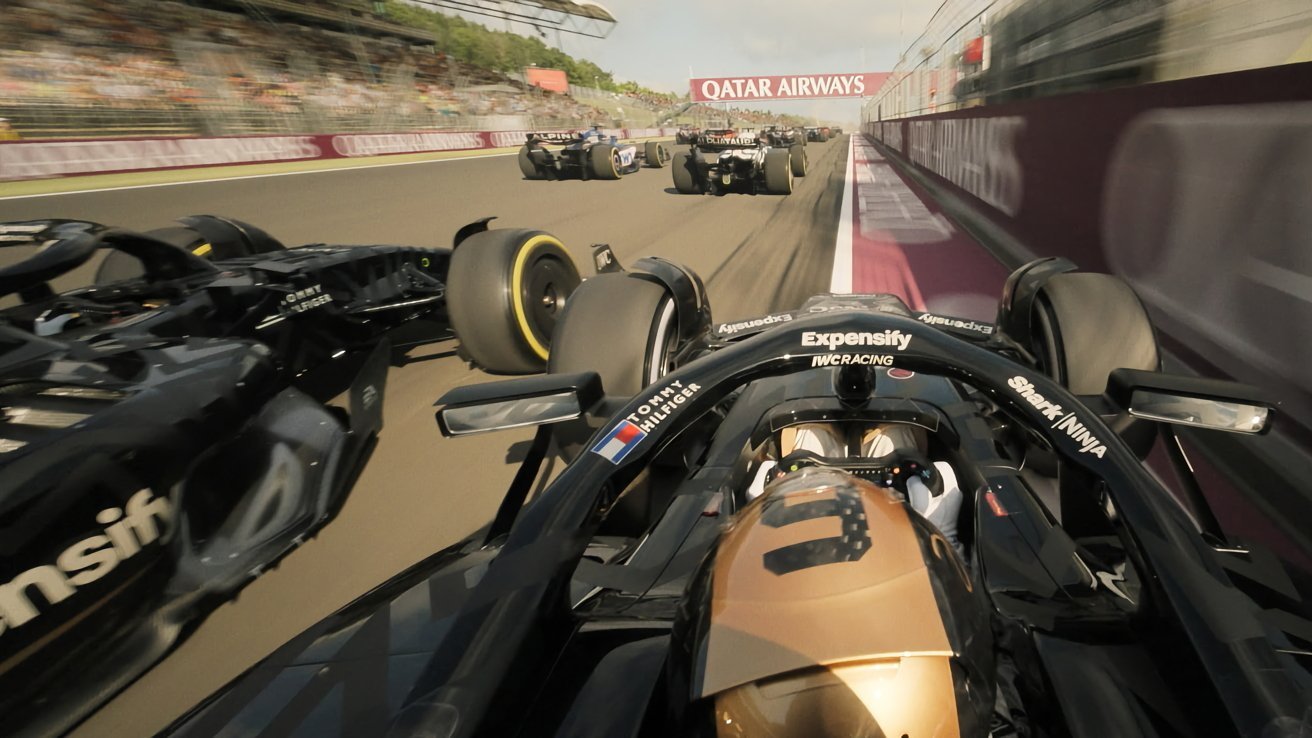Apple's 'F1' movie tops box office, expects to earn over $300 million
Apple's latest theatrical release, F1, has been a roaring success with audiences -- but will likely only just break even in its cinema run.

Brad Pitt stars in Apple's original film F1. Image credit: Scott Garfield/Warner Bros/Apple Original Films
The company is enjoying its first summer blockbuster movie, with F1 surpassing $200M in box-office receipts since it opened on June 27. It could top $300 million by mid-July, meaning the film would only now start turning a profit.
Star Brad Pitt has seen the film give him his biggest opening weekend box office of his career. Warner Bros. Distribution Chief Jeff Goldstein believes the film will stay in theatres for a few more weeks, saying "there's a lot of gas left in the tank" for it.
The film itself was estimated to have a budget of more than $200M, and distribution costs for the global release have topped $50M. F1, which was co-produced with Pitt's Plan B Entertainment company and producer Jerry Bruckheimer, is expected to be the first Apple Original Film to turn a substantial profit.
Movie will head to on-demand ahead of Apple TV+ debut
"This has proved that [Apple] can do theatrical [releases]," an unnamed studio representative told the UK's Financial Times. "With F1, they were looking for something very commercial."
Following its theatrical run -- which could continue into August -- Apple plans to make the movie available for premium on-demand video services in an effort to gain additional revenue. It will then debut on Apple TV+ later this year.
Apple has been willing to invest money into its original films unit in an effort to raise its profile for quality productions, as well as to add prestige and viewers to its Apple TV+ service. F1 was produced by Jerry Bruckheimer and directed by Joseph Kosinski, who also directed Top Gun: Maverick (2022).
In 2021, Apple's first theatrical release CODA won the Best Picture Oscar for that year, and the company has since released a string of critically-acclaimed films. These have included director Joel Coen's The Tragedy of Macbeth with Denzel Washington, Todd Haynes' documentary The Velvet Underground, and Martin Scorsese's Killers of the Flower Moon.
Killers was nominated for 10 Academy Awards, and won Best Film for 2023 from the National Board of Review. It also managed to secure a Screen Actor Guild Award and Golden Globe award for co-star Lily Gladstone.
However, like most other Apple Original Films, its theatrical run fell short of recouping its $215M cost.
A mixed track record
While theatrical-run box office receipts are not the best method to judge the quality of a movie, Apple was clearly aiming for a project that would generate both profits and worldwide media attention for its film division.

Apple used iPhone parts to make a custom movie camera for 'F1.' Image credit: Apple
In 2023, Apple released an epic Ridley Scott production of Napoleon, while 2024's big theatrical release for the company was the spy-action-comedy Argylle, starring Henry Cavill and Bryce Dallas Howard. Both films lost money in their theatrical runs, but made income from on-demand and home rental licensing.
That said, Apple's success in so many of its other endeavors means that it can afford to take risks in its movie division. Napoleon, like Argylle, barely made back their production costs, resulting in notable losses overall.
Initially, Apple Original Films was looking for awards and other critical acclaim, but with F1, the company has a likely global blockbuster on their hands. It remains to be seen if Apple will pivot to more crowd-pleasing movies, or keep its current mix of critical and popular original productions.
For its part, Apple takes a holistic view of its overall film track record, insisting that due to the combination of theatrical-run income, foreign sales, Apple TV+ subscription attraction, and other outlets mean that its films are all ultimately profitable.
Read on AppleInsider

Comments
Before streaming, films would hit the theater first, go to physical media sales (tape, optical disc), before ending up in rental availability (bricks-and-mortar stores like Blockbuster, later mail services like early Netflix).
Since this particular title is tracking the actual F1 season and that motorsport's fanbase, there's an incentive for some people to pay the VOD upcharge while their attention is still on the season. Most likely it will go to streaming subscribers near the end or after the F1 season concludes (December) and peoples' interest drift elsewhere (like soccer/football).
Again none of this is rocket science.
Cruise knew this and held up release of Maverick for two years, until after the worst of COVID, so it would be released on the big screen. Because it's a big screen movie.
Hanks had wanted Apple to do the same thing with Greyhound, but Apple said no, and made it a streamer. Hanks doesn't have quite the clout Cruise has. I don't know that it would have been a great cinema experience but I like it a lot.
Box office is a big motivator of course. But making a big movie like F1 and skipping on-demand is foolish.
Big screen, on-demand, then ATV+ is not just typical of a big movie, it's necessary to make a decent profit. Not many studios want to make a great movie that doesn't make money.. F1 did make $40Million in sponsorships, LOL.
Apple has no broadcast/streaming rights to the real motorsports competition. Most films have a theatrical run of about four weeks (some kids movies are the typical exception because of repeat viewings). F1: The Movie already dropped off -54% (domestic box office) this past weekend compared to the opening weekend. Ticket sales will continue to plummet and in 3-4 weeks it will not be in theaters.
People aren't going to sign up for a TV streaming subscription service for one 155 minute film. Everyone knows eventually it'll be on streaming services.
Hell, more people probably sign up for Apple's exclusives like Ted Lasso or Severance because they believe that more content is on the way. When the ending credits roll on F1: The Movie, that's it and many people make a beeline for the exits.
F1: The Movie will likely break even on its rumored $300 million budget. That's not a success story in the film industry. A successful movie makes a lot of money compared to its budget. For example Risky Business (1983) had a $6.2 million budget and made $63 million domestically. The Matrix (1999) made $467 million worldwide on a $63 million budget. THOSE are success stories in Hollywood.
F1: The Movie would really need to make a billion worldwide to really be considered a box office success. It would have to start by covering its budget on domestic box office which it is nowhere close to: about two-thirds of F1's box office revenue is international which is unsurprising because Formula One's popularity is greater internationally than in the USA.